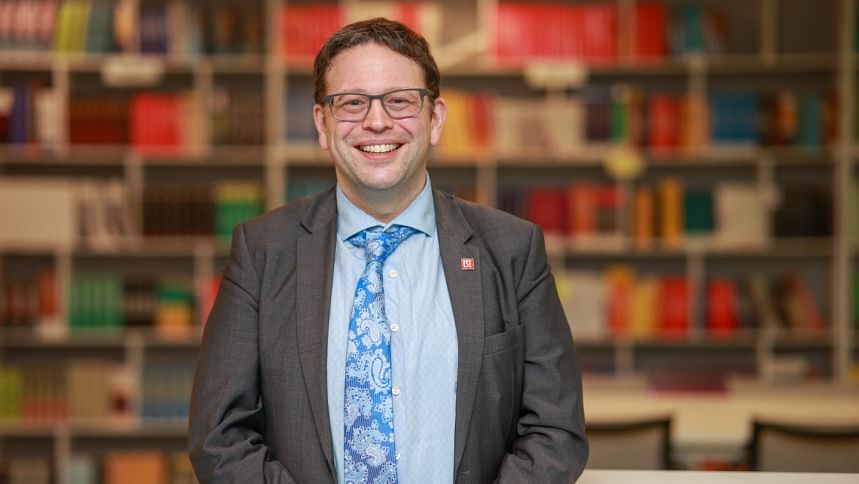In conversation with Dr James Abdey

Campus sat down with him in an interview where he reflected on the international programmes offered by Universal College Bangladesh (UCB) in collaboration with LSE-UoL, the state of higher education in Bangladesh, and where UCB and LSE fit in within the existing framework.
Campus (C): Can you elaborate on the collaboration between the London School of Economics (LSE) and Universal College Bangladesh (UCB), and its impact on higher education accessibility in Bangladesh?
Dr James Abdey (J): One of LSE's current strategic objectives is to educate for global impact. The UoL programme is LSE's way to reach a far greater number of students at the undergraduate level than we could ever hope to teach exclusively in London. The LSE campus itself has about four thousand students but through the programmes, we have about 10,000 globally. All of them are studying at recognised teaching centres, of which UCB is the only one in Bangladesh. We are very passionate about the programmes because they give students the opportunity to pursue an LSE-designed degree at a far lower cost as opposed to studying in London. Despite it being a great city, London isn't cheap. You're also having to pay a higher amount as an international student and the costs are prohibitive for many. Having UCB here in Bangladesh allows students to experience an LSE curriculum closer to home at a much lower cost and enables them to graduate with an LSE degree. It could benefit them in a number of ways, perhaps in pursuing postgraduate studies abroad or even in terms of employment.
C: What advantages can students gain by studying the LSE curricula in Bangladesh instead of directly moving abroad?
J: The academic rigour of LSE courses underlies the value of the academic degree certificates which the students are awarded. These, of course, are highly valued by employers all across the world. I always tell prospective students that not all degrees are equal. It varies depending on the degree-awarding institution, how well regarded that is, the academic content within the degree, and also how they're assessed. All of the students at UCB will sit for exams that LSE academics prepare. While students sit for their exams locally in proctored exam hall conditions, the exams themselves are graded back by LSE-appointed examiners. So, there's a strong quality assurance process at play. I think it's important that students, parents, prospective employers, master's admission officers, and faculties have confidence in the academic rigour of the programmes which reinforces the value of the degree.
C: How does the Certificate of Higher Education in Social Science (CHESS) programme bridge the gap for HSC graduates aiming to enrol in LSE programmes?
J: We operate in many countries around the world where the school education system varies a great deal. So, prospective students come in with different levels of qualifications – some of whom don't immediately meet the standard entry criteria. Rather than outright rejecting them, we want to offer an alternative pathway. CHESS is essentially year one of the three-year degree. If you're doing standard degree entry, you're already in the degree. Whereas for CHESS, to progress to year two, you need to attain a minimum level of academic performance. CHESS provides more flexibility to accommodate different potential applicants' needs. It's all about reducing barriers, not creating them.
C: What career prospects and international exposure do UCB-LSE students receive during and after their studies?
J: In terms of international experience, one option available to students is the LSE summer school which involves spending some time at LSE. I believe we are the largest summer school programme of its kind. We welcomed about 6,000 students in 2024 from all over the world. If a student were to take two summer school courses at LSE, sit for the exams, and pass them, they can actually use it for credit back towards their UoL degree. If they do that, they can just take one fewer subject in the final year. As for employability, UCB has career placement schemes with six leading companies to help students get internship placements. It is a great opportunity for students to tap into. In fact, within the degree programme, we've had a much stronger focus on employability skills. There are about ten core employability skills some of which include adaptability, resilience, complex problem-solving, communication skills etc. When students study their individual modules, we identify – for each one – three of the ten skills which that module will seek to develop.
C: What steps is UCB taking to integrate LSE's rigorous academic practices while maintaining local cultural relevance?
J: We are very much a global programme. So, while the curriculum is set in London, the LSE examiners welcome more local examples. The faculty at teaching centres have complete autonomy in giving more of those examples. Our motto is to understand the causes of things. That's what LSE has always been about. I always think an examination is a student's opportunity to demonstrate their understanding of the course materials. It's about their thought process and showing how they're getting to that answer which is really the hallmark of the LSE approach to teaching through these programmes.
Abir Hossain is a sub-editor at The Daily Star.

 For all latest news, follow The Daily Star's Google News channel.
For all latest news, follow The Daily Star's Google News channel. 








Comments